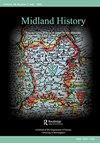BCLM: Forging Ahead at Black Country Living Museum
IF 0.1
Q3 HISTORY
引用次数: 0
Abstract
BCLM: Forging Ahead is a £30 million project at the Black Country Living Museum (BCLM) in Dudley, West Midlands, telling the story of the Black Country region, 1945– 1968. BCLM is an open-air living museum, currently tracing the history of the region between 1712 and 1939, and its interpretation focuses on interactions with costumed historic characters in accurately reproduced historic environments including mines, factories, shops and homes. Forging Ahead is the largest single development since BCLM opened in 1978 and has been supported by several major funders. Alongside new visitor and learning centres the project’s focus is a new historic town and industrial area. The Black Country, comprising the coal and metalworking communities north and west of Birmingham, was central to Britain’s recovery from World War Two. Its industry ran at full capacity during the war, and it was thus ideally placed to meet the manufacturing and export needs of the country in the years after. The Black Country made everything from hammers to washing machines, bicycle saddles to heavy engineering. This capacity, combined with a severe postwar labour shortage, drove up wages and working conditions: for the first time, the Black Country’s working class shared to some degree in its wealth, and the region became one of the country’s most prosperous industrial areas. This was matched by bold new approaches to social democracy and public provision, resulting in the transformation of a notoriously derelict landscape by new housing, town centres and industry (Figure 1). This story will be told using over twenty buildings set in the postwar years. Although changing heritage policy means that the traditional method of moving buildings brickby-brick is less feasible than when the museum first opened, there will be some ‘translocated’ buildings in the project. The most notable is Woodside Library, from Holly Hall, Dudley. Originally opened in 1894 on land donated by the Earl of Dudley, Woodside Library closed in 2008. In its new home at BCLM, it will tell stories of reading and education in the 1960s, including Dudley’s pioneering library service, whose director A. M. Wilson introduced records, paperbacks and children’s clubs to borough libraries. Recreations of lost buildings include Stanton’s music shop from Dudley, Smith Edge Tools from Oldbury, and Langer’s Army & Navy Stores from Stourbridge. We are replicating some buildings that are still in existence to tell other key stories – for instance, an NHS infant welfare centre from Wolverhampton and one of the oldest family-run newsagents in the country, Burgin’s from Dudley.BCLM:在黑人乡村生活博物馆前进
BCLM:勇往直前是位于西米德兰兹郡达德利的黑人乡村生活博物馆(BCLM)耗资3000万英镑的项目,讲述了1945年至1968年黑人乡村地区的故事。BCLM是一个露天生活博物馆,目前追踪1712年至1939年间该地区的历史,其解释侧重于在准确再现的历史环境中与穿着盛装的历史人物的互动,包括矿山、工厂、商店和住宅。Forging Ahead是自1978年BCLM开业以来最大的单一开发项目,并得到了几个主要资助者的支持。除了新的游客和学习中心,该项目的重点是一个新的历史城镇和工业区。黑人国家由伯明翰北部和西部的煤炭和金属加工社区组成,是英国从第二次世界大战中复苏的中心。其工业在战争期间满负荷运转,因此处于满足该国未来几年制造和出口需求的理想位置。黑人国家制造了从锤子到洗衣机、自行车鞍座到重型工程的一切。这种能力,再加上战后严重的劳动力短缺,推高了工资和工作条件:黑人国家的工人阶级首次在一定程度上分享了其财富,该地区成为该国最繁荣的工业区之一。与此相匹配的是大胆的社会民主和公共供应新方法,通过新的住房、城镇中心和工业改变了臭名昭著的废弃景观(图1)。这个故事将以战后20多座建筑为背景讲述。尽管不断变化的遗产政策意味着传统的逐砖搬迁建筑的方法比博物馆刚开放时不太可行,但该项目中会有一些“迁移”的建筑。最著名的是达德利霍利·霍尔的伍德赛德图书馆。伍德赛德图书馆最初于1894年在达德利伯爵捐赠的土地上开放,于2008年关闭。在BCLM的新家中,它将讲述20世纪60年代的阅读和教育故事,包括达德利开创性的图书馆服务,该服务的主管A.M.Wilson向自治区图书馆介绍了唱片、平装书和儿童俱乐部。对失落建筑的重建包括达德利的斯坦顿音乐店、奥德伯里的史密斯边缘工具店和斯托布里奇的兰格陆军和海军商店。我们正在复制一些仍然存在的建筑,以讲述其他关键故事——例如,来自伍尔弗汉普顿的英国国家医疗服务体系婴儿福利中心和来自达德利的Burgin’s,这是该国最古老的家庭经营的报刊社之一。
本文章由计算机程序翻译,如有差异,请以英文原文为准。
求助全文
约1分钟内获得全文
求助全文

 求助内容:
求助内容: 应助结果提醒方式:
应助结果提醒方式:


